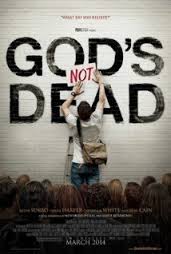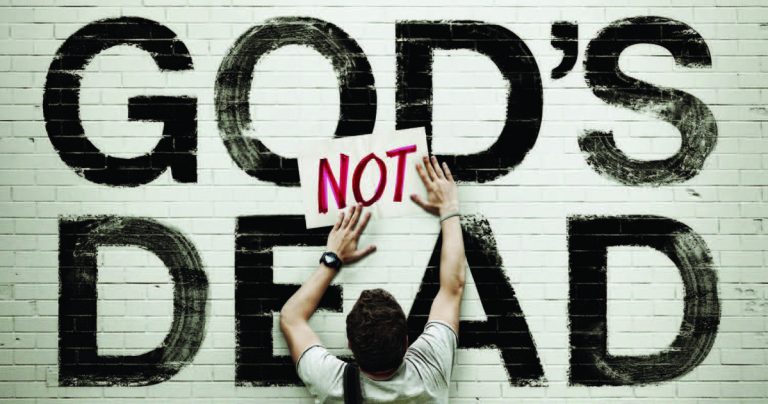Ah, more Christian victimhood… so predictable. Growing up in a fundamentalist church setting means that you see a lot of propaganda; straw men are set up to be toppled over in the most unlikely scenarios invented to set up a moral superiority lesson. All of it to promote a sinner versus saved ideology.

What am I talking about? The newly released fundamentalist Christian crusade film called “God’s Not Dead.” However, in the spirit of full disclosure, I have not seen the film, nor do I plan to. Having been raised in a Christian fundamentalist home I have seen my share of the Left Behinds, the Kirk Camerons, and the everlasting boogeyman, the atheist antagonist. So forgive me, but my take on this film comes from my experience with the genre, mainstream reviews, and stalking the right-wing blogosphere as they crow about their latest triumph over the godless masses.
So let’s get to the criticism. The premise is a joke. Any professor, or philosopher, or any other academic for that matter who wants to be taken seriously, and is worth their salt, wouldn’t consider manipulative BS where students sign contracts to deny God. (Actually, the more likely scenario is that you must suspend all disbelief and embrace a 6 day young earth creation story and deny evolution in a Christian college or face a failing grade.) Right off the top our young and faithful protagonist squares off with the devil… er, I mean we have the tired cliché of the hostile and arrogant atheist — their standby whipping boy — persecuting the helpless, callow kid. The rest follows in typical fashion: relationship/family drama, lots of prayer, new found courage and faith, and finally, the defeat of the atheist logic. Boom! Game over, atheists! They just won. Or maybe they didn’t…
The previous paragraph was just a criticism of the tired old trope, and perhaps less of this latest movie in particular. In reality, conservative Christians aren’t winning at all. Every film they produce, every dollar they spend to promote their own pious virtue while ignoring the poor, the sick and the hungry is another mark against them. And why, oh why, must they always have an enemy? Be it gays, atheists or Muslims, conservative Christians have never ending fodder to choose from. But is that representative of the radical inclusiveness of Jesus?
So what does a film like this accomplish? Well, for one, it’s a rallying call. The political landscape continues to change, young voters support gay marriage, they’re concerned about the equality of immigrants, and they’re tired of the dogma of a largely conservative society. All of which is a threat to conservative ideology. Another reason is to promote a sense of spiritual arrogance (ie, self-righteousness). We’re all guilty of it, and yes, there are smug and arrogant atheists. But the purpose of this film is to reinforce their rightness, and by default, everyone else’s wrongness. It probably doesn’t hurt either that some money can be made. Anytime you have a “Christian” product you get a line of supportive buyers honoring God with their dollars. Somebody has done that math.
I identify as a Christian, but I find it laughable to feel under attack in this country. After all, this movie was made to attack a relatively small group of people and their beliefs, not the other way around. I would be much more excited to see a movie about what people of the Christian faith are doing to fight for the poor and against poverty, how they’re standing up for the marginalized, or how they’re protesting for peace. But alas, it’s easier to create garbage and cast yourself as the victim group to get out all of your real responsibilities.
God is not dead. But ideology that centers on self, on a victim mentality, and on narrow mindedness and bigotry sure is.
[box type=”bio]
 KIENAN MICK is a resident of the beautiful, lake filled Twin Cities. He has a degree in Economics from the University of Minnesota, and an MS in Applied Economics from the University of North Dakota. In his spare time, he enjoys amateur photography, nature hikes, and bird watching. His interests lie in “alternative” economic systems where the public, unions, and co-ops take a greater stake in our economy.
KIENAN MICK is a resident of the beautiful, lake filled Twin Cities. He has a degree in Economics from the University of Minnesota, and an MS in Applied Economics from the University of North Dakota. In his spare time, he enjoys amateur photography, nature hikes, and bird watching. His interests lie in “alternative” economic systems where the public, unions, and co-ops take a greater stake in our economy.
[/box]



